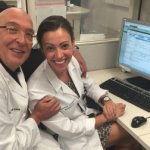
Advancing Targeted Research
As one important step in achieving its mission to advance research and training in rheumatology to help improve the health of people with rheumatic diseases, the Rheumatology Research Foundation launched its Disease Targeted Research Initiative seven years ago. In that span, the Foundation has awarded 101 pilot and innovative research grants, totaling $43.2 million, to investigators exploring aspects of rheumatoid arthritis (RA) and other forms of inflammatory disease.
On June 21–23 at the Fairmont Hotel in Dallas, the Rheumatology Research Foundation gathered a group of these investigators to present their latest findings. In addition to poster presentations, 22 investigators from institutions around the U.S. had the opportunity to engage in collaborative discussions surrounding inflammatory disease. Live sessions included presentations on drug clinical trial updates, cardiovascular risk in RA, epigenetics, outcome measures and quality, disease pathogenesis, pathways of inflammation, and other topics.
Based on the quality of the research presented at the meeting and the positive response from many attendees, the Investigators Meeting was “an unqualified success,” says David Daikh, MD, PhD, the Foundation’s President. “The relatively small and intimate meeting provided investigators focused on a single and important topic—inflammatory arthritis—the opportunity to share and discuss new ideas.”
The research presented at the Dallas meeting will not just be of interest to rheumatologists, but will also resonate with the patient community, as it may generate more effective treatments and preventive measures in RA, says Dr. Daikh. “For example, new understanding about the role of gingivitis in disease activity in rheumatoid arthritis has important implications in developing new ways of preventing disease and decreasing disease activity,” he says. “Similarly, results from a new clinical trial funded by the Foundation may show how to identify the development of cardiovascular disease in patients with inflammatory arthritis in time to initiate preventive therapy.”
Even though the Disease Targeted Research Initiative is only a few years old, the results of the Foundation’s commitment to these investigators already reveal important data that will one day help rheumatologists and their patients better tackle these diseases, says David Karp, MD, PhD, the Foundation’s Vice President. Success breeds success, with exciting findings sparking further studies, he adds.
“These meetings have become a highlight of the program, as the top researchers in the field get a chance to share their findings and discuss new projects. The meetings are small, and allow for a lot of informal discussion and cross-fertilization of ideas. Even though the program is still relatively young, we have seen ideas for newly funded projects spring from previous meetings,” says Dr. Karp.
When the Foundation launched this initiative, it sought to find “the best, most innovative projects and give them enough funding to move … to the next level,” Dr. Karp adds. Grant applicants included researchers outside of rheumatology and those new to RA research. “Of our 101 funded investigators, 87 have gone on to secure [a total of] $187 million in NIH funding. They have published 200 articles and delivered over 300 presentations on their Rheumatology Research Foundation–funded work,” says Dr. Karp.
One of the investigators presenting his findings at the meeting, Michael Holers, MD, says this extraordinarily important program will help rheumatologists discover new ways to treat their RA patients.
“Support from the Foundation has been critical to those of us who are interested in figuring out how rheumatoid arthritis starts in individuals who demonstrate highly related antibodies, but who are initially asymptomatic for several years prior to subsequently developing pain and swelling,” says Dr. Holers, a rheumatologist at the University of Colorado, Denver. “In this area of exploratory high-risk, high-reward research, continued support of the Foundation has the real potential to lead to prevention of the development of this disease.”
The exciting results of the Dallas investigators meeting highlight the importance of the Foundation’s continuing support for its disease-targeted research efforts, says Dr. Daikh. Unearthing the causes of rheumatic diseases, developing new treatments, and possibly finding a cure for these patients will only come from long-term commitment to fundamental research and training, he says.
“A strong academic research community has been the backbone of rheumatology training programs across the country. The ongoing work and survival of a strong research community is absolutely vital to ensure future discoveries and to the ongoing health of rheumatology training programs,” says Dr. Daikh. “Support of these investigators through the funds given to the Foundation is of great importance to patients and to the rheumatology community as a whole.”
For more information on the Rheumatology Research Foundation or to learn more about the Disease Targeted Research program, please call (404) 633-3777 or visit www.rheumatology.org/foundation.


